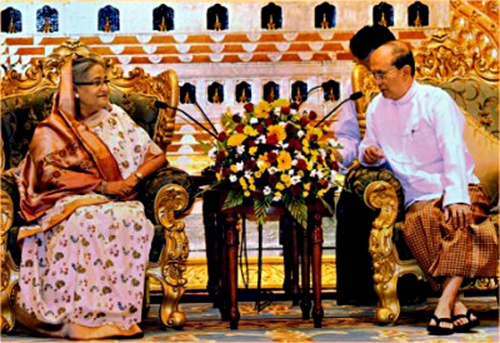Chittagong, Bangladesh: Burma will take back Rohingya refugees from Bangladesh after verification, according to a government official. This was the assurance Burmese President U Thein Sein gave to Prime Minister Sheikh Hasina during official talks in Nay Pyi Taw on December 6.

Thein Sein further told the Bangladeshi Prime Minister the repatriation would begin soon using the already cleared list of refugees under the aegis of the UNHCR.
“The government will take back about 28,000 Rohingya refugees,” the official said, “those have been living long term in two official refugee camps - Nayapara and Kutupalong. We will take back all Rohingya refugees after verifying them as per agreed criterion between the two countries.”
The Bangladeshi Foreign Minister made a similar call in Bali in September 2009, after the Awami League led alliance assumed power. However, Burma delayed processing the repatriations. Whenever Bangladeshi and Burma met after that, the Rohingya repatriation issue was raised, but without success. This time, though, the Burmese position has shifted.
For almost two decades, Bangladesh has had to tolerate the population pressure of a very large number of Rohingyas. These were illegally evicted from their homes despite the fact that they had been living in that region of Burma for centuries.
This issue has been dragging on for last twenty years. Out of 250,000 refugees, 225,000 were repatriated a long time ago and those remaining have been stagnating, despite several commitments made by the Burma.
The Rohingya refugees included not only those registered but also several 100 thousand unregistered refugees in the Teknaf area. This must also be considered. What we need are good intentions and acceptable solutions, otherwise nothing will happen, said a Bangladeshi citizen commenting in the Daily Star newspaper’s website.
One of the most difficult bilateral issues between Burma and Bangladesh is the Rohingya one. It first cropped up in 1978 but within a year was resolved amicably with Myanmar. Another flow of refugees came to Bangladesh in 1991 and again in 1997. About 38,720 refugees reportedly remained in Bangladesh and negotiation on the issue continues still, according to a lawyer, Barrister Harun Ur Rashid.
Many of these refugees have since managed to merge with the local population and receive Bangladeshi passports, traveling abroad as Bangladeshi workers, said local politicians.
Despite its own limitations, the Bangladesh government has handled the refugee issue with a humanitarian approach. It has extended all kinds of assistance to its eastern neighbor to help the repatriation process.
Bangladesh hopes for quick repatriations and they support their PM's suggestion to establish a working group for a permanent resolution of the problem, said a local trader from Teknaf.
Despite the regular assistance of the donor agencies and other international organizations, the situation in the camps was poor, particularly in maintaining law and order. There were social and environmental problems for Bangladesh as forest resources were being degraded, according to the local villagers near refugee camps.



